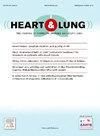生物人工瓣膜与机械瓣膜主动脉瓣置换术后的长期疗效对比。
IF 2.4
4区 医学
Q2 CARDIAC & CARDIOVASCULAR SYSTEMS
引用次数: 0
摘要
背景:主动脉瓣疾病(AVD)占瓣膜性心脏病(VHD)的 33%,但却导致 60% 以上的 VHD 死亡率。对于手术主动脉瓣置换术,建议 70 岁以上的患者使用机械瓣膜:方法:4,927 名患者接受了自体瓣膜置换术,其中 744 名患者按 2:1 的倾向匹配生物瓣膜和机械瓣膜。结果包括死亡率、发病率和再次手术率:倾向匹配组的平均年龄分别为57岁和56.7岁,生物瓣膜组和机械瓣膜组的女性比例分别为26.4%和25.0%。两组患者的其他基线人口统计学特征和合并症相似。各组在30天内无死亡病例,并发症发生率也无差异(P > 0.05)。1年、5年和15年的死亡率两组相似。生物瓣膜和机械瓣膜在5年和10年的再手术率没有明显差异(P = 0.84,P = 0.31),但在15年的随访中,生物瓣膜患者更有可能需要再手术(21.2%对9.7%,调整后危险比3.65,95%置信区间1.07-12.5,P = 0.0.39):结论:50至70岁接受房室重建术的患者,无论接受的是生物瓣膜还是机械瓣膜,其长期预后都相似,只有在随访15年时再手术率有显著差异。生物瓣膜的再手术率和死亡率都很低,而且无需抗凝治疗,因此对于50-70岁的患者来说,生物瓣膜是一个合理的选择,尽管机械瓣膜仍能为年轻患者带来耐久性方面的优势。本文章由计算机程序翻译,如有差异,请以英文原文为准。
Long-term outcomes following aortic valve replacement in bioprosthetic vs mechanical valves
Background
Aortic valve disease(AVD) accounts for 33 % of valvular heart disease(VHD) but causes over 60 % of VHD mortality. For surgical AVR, mechanical valves are recommended for patients <50 years old and bioprosthetic valves for those >70 years old.
Objectives
To investigate the long-term differences following AV replacement(AVR) comparing bioprosthetic and mechanical valves in patients aged 50–70.
Methods
4,927 patients underwent AVR, 744 of which were propensity-matched 2:1 for bioprosthetic and mechanical valves. Outcomes included mortality, morbidity, and rates of reoperation.
Results
The average age of the propensity-matched groups was 57 and 56.7 years, and female sex accounted for 26.4 % and 25.0 % for the bioprosthetic and mechanical valve groups, respectively. Other baseline demographics and comorbidities were similar between the groups. There were no deaths at 30 days and complication rates did not differ between groups(p > 0.05). Mortality at 1, 5, and 15 years was similar between groups. Reoperation rates at 5 and 10 years did not significantly differ between bioprosthetic and mechanical valves(p = 0.84, p = 0.31), although at 15-year follow-up, patients with bioprosthetic valves were more likely to require reoperation(21.2 % versus 9.7 %, adjusted hazard ratio 3.65, 95 % confidence interval 1.07–12.5, p = 0.0.39).
Conclusions
Patients receiving AVR from 50 to 70 years old have similar long-term outcomes irrespective of whether they received bioprosthetic or mechanical valves, with only reoperation being significantly different at 15 years follow-up. With low rates of reoperation, mortality, and avoidance of anticoagulation, bioprosthetic valves are a reasonable option for patients 50–70 years old, although mechanical valves still provide a durability benefit for young patients.
求助全文
通过发布文献求助,成功后即可免费获取论文全文。
去求助
来源期刊

Heart & Lung
医学-呼吸系统
CiteScore
4.60
自引率
3.60%
发文量
184
审稿时长
35 days
期刊介绍:
Heart & Lung: The Journal of Cardiopulmonary and Acute Care, the official publication of The American Association of Heart Failure Nurses, presents original, peer-reviewed articles on techniques, advances, investigations, and observations related to the care of patients with acute and critical illness and patients with chronic cardiac or pulmonary disorders.
The Journal''s acute care articles focus on the care of hospitalized patients, including those in the critical and acute care settings. Because most patients who are hospitalized in acute and critical care settings have chronic conditions, we are also interested in the chronically critically ill, the care of patients with chronic cardiopulmonary disorders, their rehabilitation, and disease prevention. The Journal''s heart failure articles focus on all aspects of the care of patients with this condition. Manuscripts that are relevant to populations across the human lifespan are welcome.
 求助内容:
求助内容: 应助结果提醒方式:
应助结果提醒方式:


